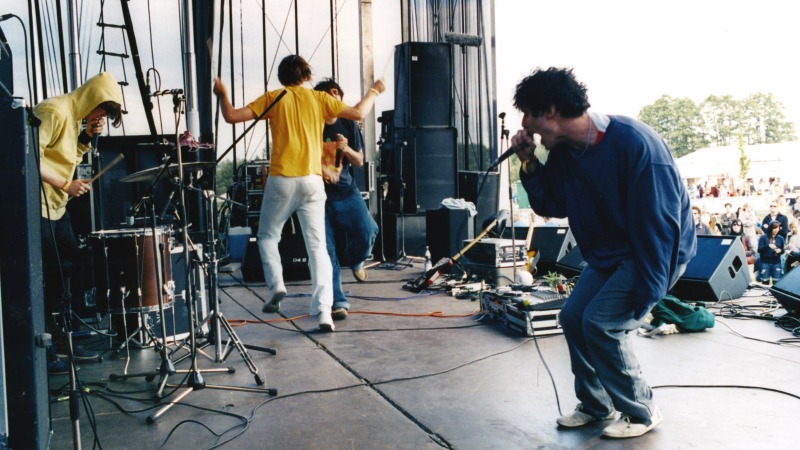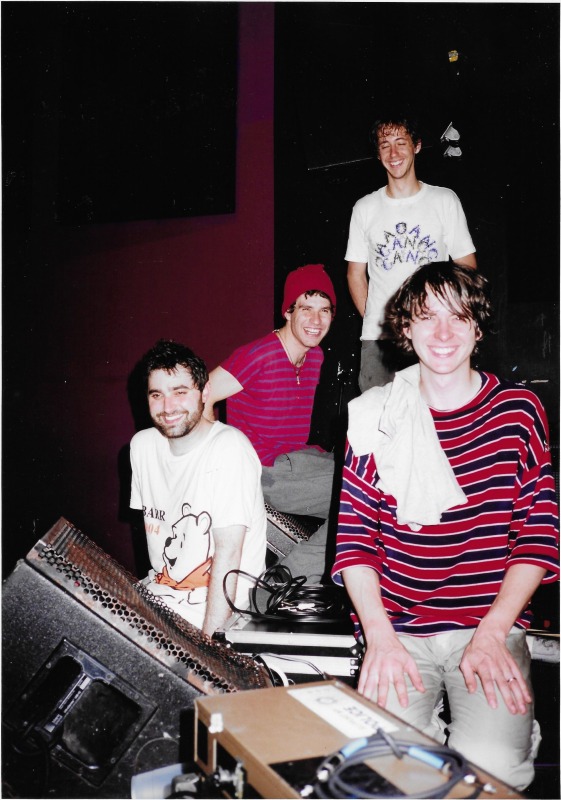COVER STORY | Animal Collective Can Laugh A Little
Avey Tare, Panda Bear, Geologist, and Deakin speak with Paste about the lasting legacy of their sixth album, Feels, and how it became a turning point for them as a band.
Photo by Joe Dilworth/Avalon/Getty Images
There are so many albums I can credit for changing my life, but none have grown with me quite like Animal Collective’s sixth album, Feels. For over a decade, it’s been a guiding light during the darkest moments and soundtracked some of my most cherished memories, too. “Banshee Beat,” the first track from Feels that I became obsessed with and then devastated by, played on repeat after someone I was dating during my sophomore year of college ghosted me after I’d opened up to him about being sexually assaulted, because it resurfaced his own unprocessed trauma. I came to terms with carrying the weight of my heartache, finding comfort in its words when nothing else helped: “But I don’t wish that I was dead /Now a very old friend of mine once said / That either way you look at it / You have your fits, I have my fits but feeling is good / Confusion’s not a kidney stone in my brain / But if we’re miscommunicating, do we feel the same?”
Just like Feels was a balm during some of the heaviest experiences, it’s also been present during moments of joy. “Purple Bottle” became my go-to song whenever I had a crush, relishing that schoolgirl-like naiveté while bursting with excitement, making me fall deeper. Other tracks, like “Loch Raven” and “Daffy Duck,” have become fixtures during road trips with my partner. Feels is played year-round on our turntable, whether it’s while doing housework or spending a Sunday afternoon together. It’s an album that I’ve thought about passing along to my future children, like a family heirloom that’s there for them whenever they need it. Other Animal Collective albums have been a transformative part of my life, from Merriweather Post Pavilion to Strawberry Jam, but as Feels turns twenty, I’ve realized that there is something monumental that the band was able to tap into then: It’s a record that feels playful and allows you to reconnect with your childlike wonder, yet it’s also stunningly mature, featuring some of Dave Portner’s (aka Avey Tare’s) most profound lyrics.
Feels came during a turning point for Animal Collective. After releasing Ark, their fourth album, in 2003, the band was still struggling to make a living from their music. They each had side gigs, including Lennox and Portner working for a shady moving company. Following Ark, Lennox and Portner made Sung Tongs as a duo, which went on to be critically acclaimed, beginning to set in motion the band’s streak of success. While they enjoyed the collaborative process of just the two of them, they realized it was time to return to the band’s original configuration, with Josh Dibb (aka Deakin) joining Portner on guitar to help shape the album’s textured sound.
“The entire guitar sound of that record is based on the way that Josh and I’s guitars go together,” explains Portner, speaking on Zoom alongside Brian Weitz (aka Geologist) from their respective homes. “We definitely had conversations back then and had delay units we really liked. Josh had an Ibanez analog delay from the eighties, I think, that we had used earlier when we weren’t playing as Animal Collective, and we really liked it a lot. So I think we were like, ‘Oh, we love the way that this delay sounds. Let’s incorporate that into the guitar sound.’ We talked a lot about the way that we wanted the guitars to go together and create this glowing [element].”
Dibb, on a Zoom call with Noah Lennox (aka Panda Bear) while on the road during their joint tour, remembers this similarly, noting that there was a “pretty conscious decision” for him and Portner to approach Feels with complementary guitars. “We were both really into finding old eighties and early nineties rack delays that were cheap things you could buy, like Ibanez rack delays were a thing, or Yamaha rack delays that usually you could pick up for fifty to a hundred bucks at the most, and run our guitars through them,” he says.
“I think we just got really into this very clean, delayed sound and the syncopation between Noah’s drumming,” he adds, “which eventually you’d had a delay on your tom mic we got into playing with all these delay times between each of our respective stations, and the dueling guitar thing between me and Dave became a theme pretty quickly.” Lennox interjects, “It was either stuff that was delayed in that rhythmic, polyrhythmic sort of way, or it was delayed so it was washy. I feel like those were the two.”
Portner recalls that Lennox, who he describes as someone who “has never been a gearhead,” envisioned Feels to be minimalistic, using just a floor tom, a snare, a hi-hat, and his sampler. It wasn’t what Portner was imagining for their next foray, but he went in with an open mind and accepted his bandmate’s approach. “I think, definitely, that [minimalism] was the plus of it all. That helped, or something like Brian playing the mini discs at that time. Those things are what created the sound of it all. It’s just a matter of making it work,” Portner admits.
The resulting record combined the essence of their previous two records, while taking Animal Collective into new, bolder terrain. “Somebody asked me recently on Instagram, ‘Why do you think at the beginning of the Feels songs, it sounded kind of more like Ark, and then towards the end, by the time you recorded it, it was more poppy and more like Sung Tongs or something?’” Portner tells me. “And I don’t think there’s really a specific answer for that. I think, whenever we have a new group of songs, it always just kind of starts out like a little bit of a mess. And it takes some jamming together. As many ideas from other places as we would bring, it’s also very important that we stay true to ourselves and have our own sound.”
While Feels was born during a time when the band had just figured out how to work together, maximizing their collaborations, it also emerged during an unprecedented moment for the group. Lennox, Portner, and Dibb were living in New York City, while Weitz had already relocated to Washington, D.C. after graduating from Columbia University to work in environmental policy. But in 2004, Lennox decided to move to Lisbon, Portugal, to settle down with his then-wife Fernanda Pereira. With Lennox being such a vital part of the band, his bandmates questioned if and how Animal Collective could continue without him.
Weitz recalls that Lennox broke the news over drinks at a bar downstairs from his apartment, where the bandmates questioned, “Is this the end, or is there a chance you want to come back?” The conversation was left open-ended, with Lennox promising they could try to work something out, as half of Feels had already been written. “During Feels, I think there was a moment where we did think, ‘Is this band going to end, or at least Noah’s involvement in it going to end, because he fell in love with this woman and wants to [move to Portugal].’ But after that, he did say, ‘Okay, I’ll come back and we can do a couple of weeks of shows and a couple of weeks of rehearsals,’” Weitz remembers. Dibb has a similar recollection, noting that the bandmates had “a bit of a question mark with Noah moving, because we weren’t making a ton of money at that point. So the idea that our bandmate was living an ocean away seemed like potentially a game-ender. How do we do this?”
-

-

-

-

-

-

-

-

-

-

-

-

-

-

-

-

-

-

-

-

-

-

-

-

-

-

-

-

-

-

-

-

-

-

-

-

-

-

-

-









































